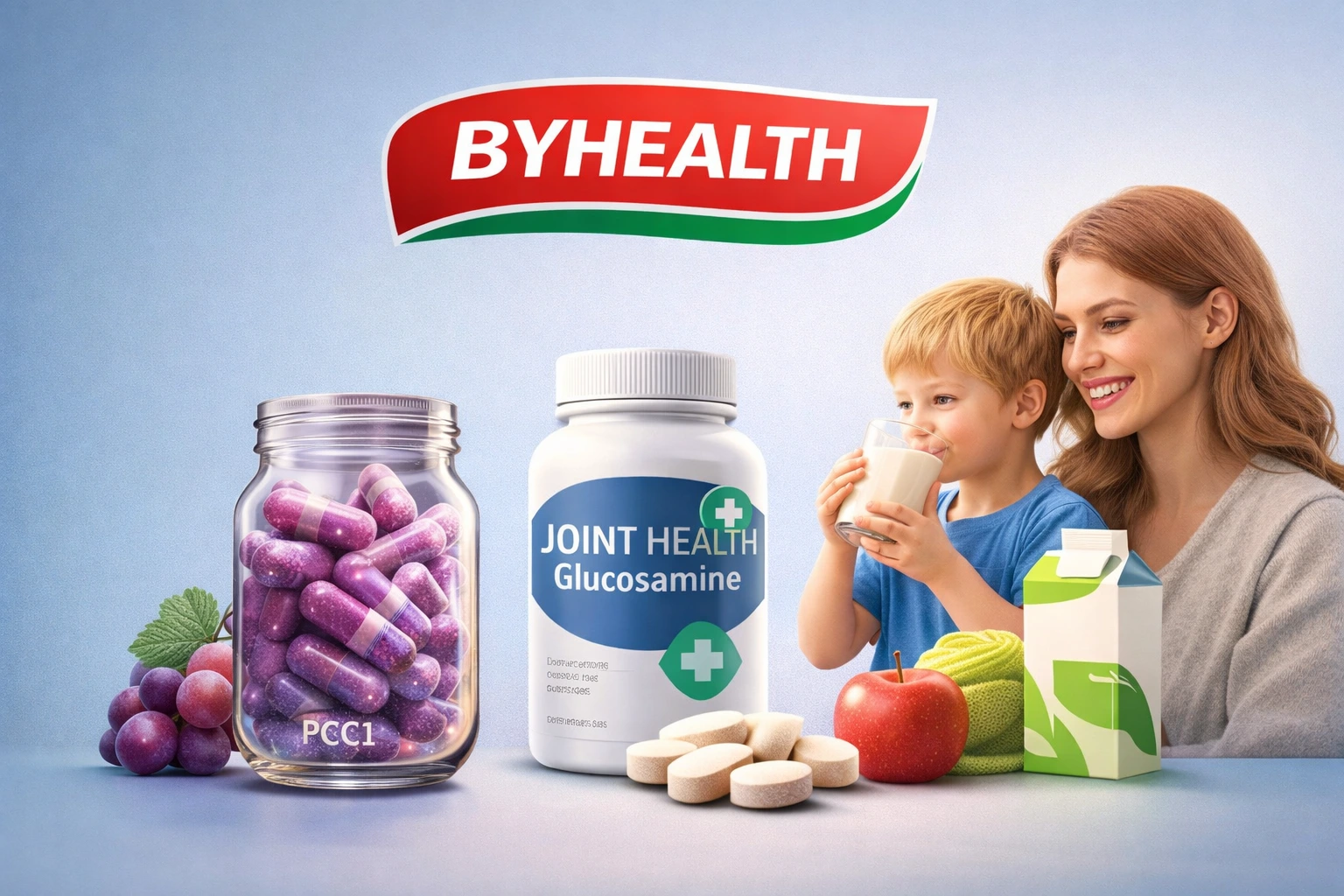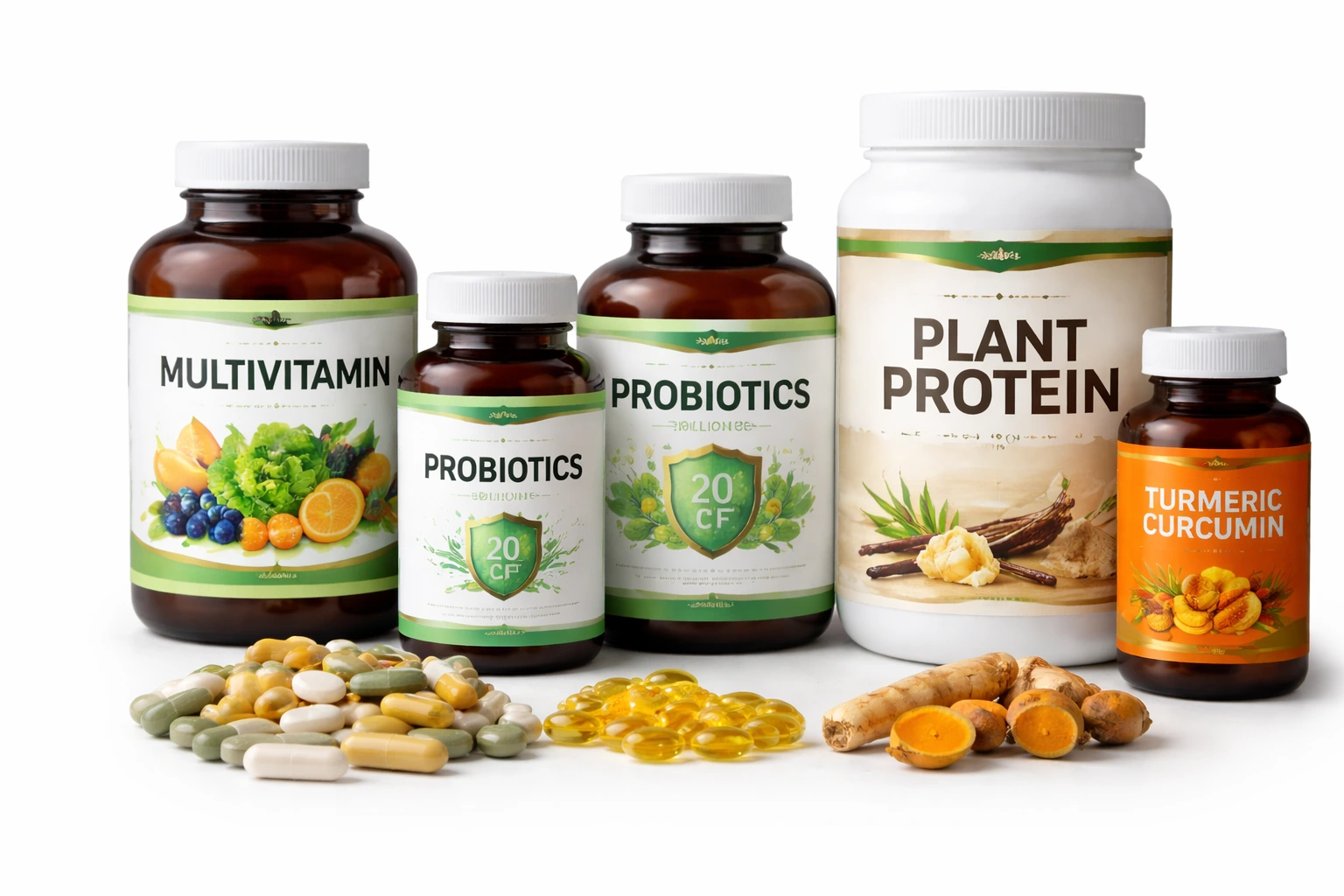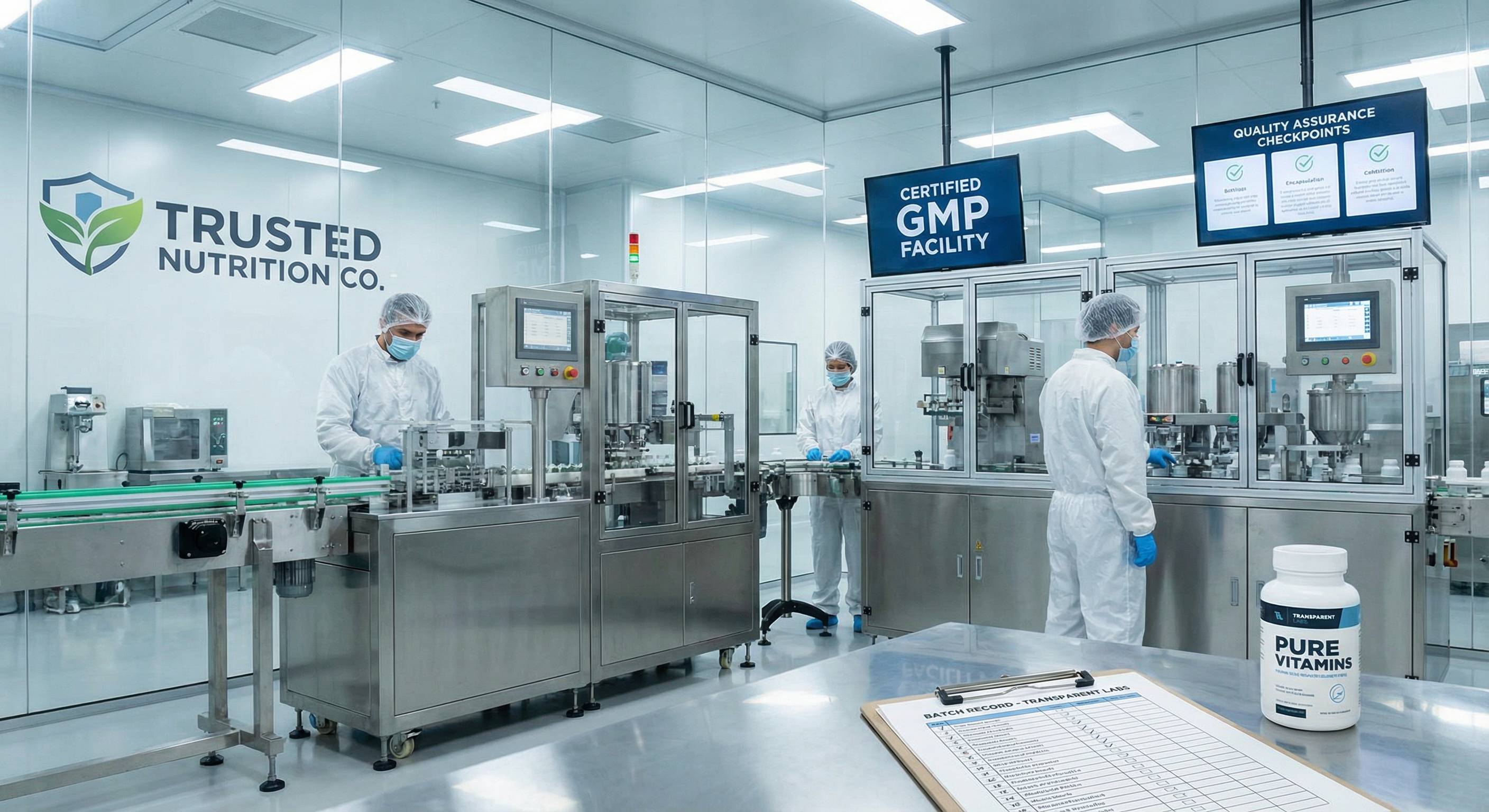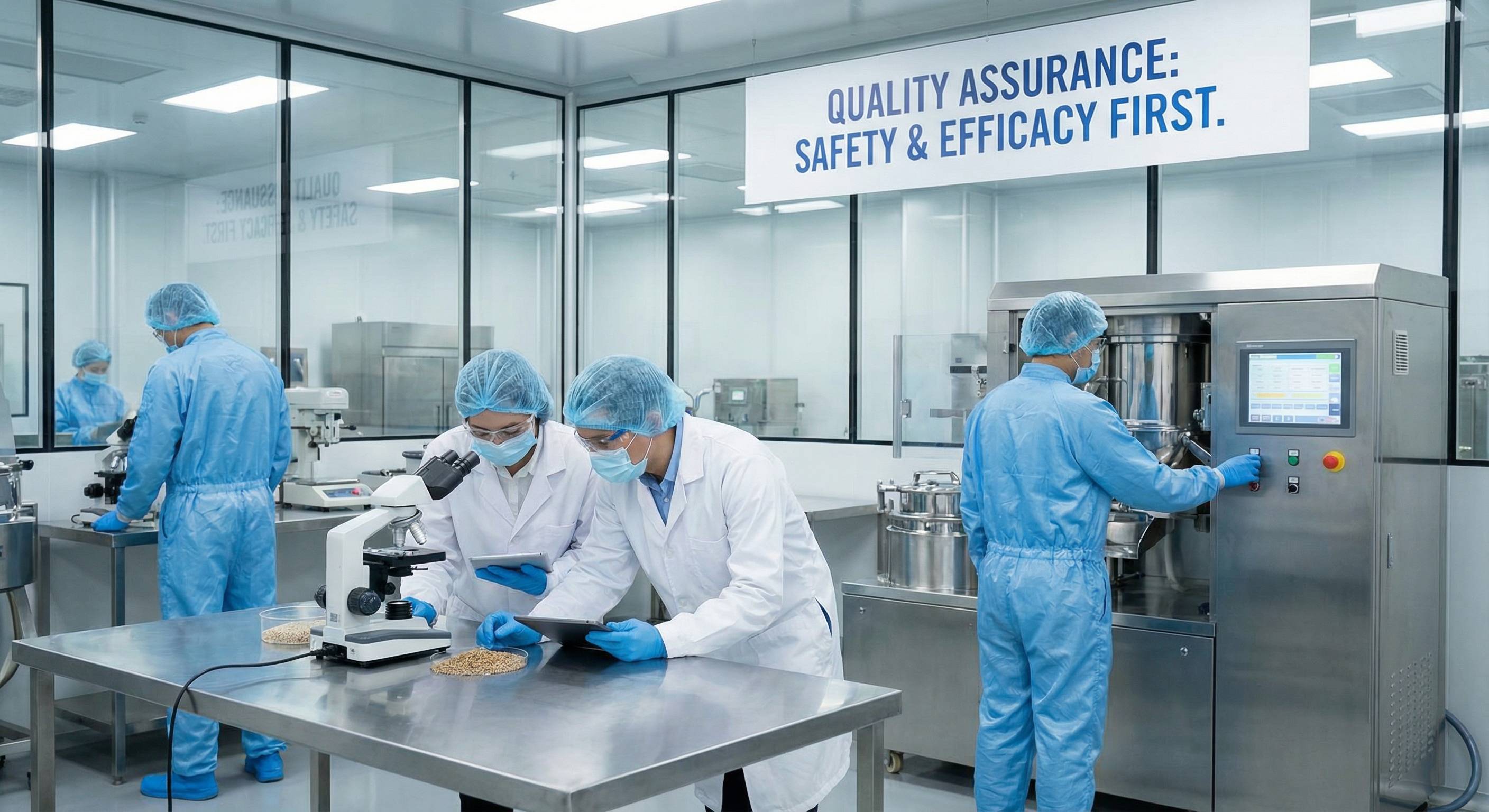Why Choosing the Right Manufacturer Matters
The global dietary supplements industry has evolved into a trillion-dollar market, projected to reach over USD 300 billion by 2030. With rising consumer demand for health, wellness, and performance solutions, new supplement brands are entering the market at an unprecedented pace. But behind every successful supplement label lies a manufacturer who can translate a vision into a physical product.
Choosing the right supplement manufacturer is more than a procurement decision; it is a strategic partnership that defines the credibility, scalability, and profitability of your brand. A poor choice can lead to product recalls, compliance violations, or reputational damage that may be impossible to recover from. Conversely, selecting a high-quality, reliable manufacturer positions your brand for long-term success, enabling innovation, consumer trust, and competitive advantage.
Many entrepreneurs approach this search with the mindset of simply “finding a factory,” but the reality is far more complex. Manufacturers differ not only in pricing and capacity but also in expertise, regulatory readiness, and ability to scale alongside your business. The question is not just where to find a supplement manufacturer, but how to evaluate, choose, and sustain a manufacturing partner who aligns with your brand’s vision and long-term goals.
Step 1: Understand Your Business Model Before Searching
Before you even begin evaluating manufacturers, it is essential to clarify your own business model. Too often, startups jump into contract discussions without a well-defined strategy, leading to mismatched expectations and wasted resources.
1. Define Your Go-to-Market Strategy
Are you planning to sell directly to consumers (DTC), through retail channels, or via cross-border e-commerce platforms like Amazon or Shopee? Each channel comes with distinct regulatory, packaging, and labeling requirements. For example:
-
DTC brands may prioritize storytelling and unique formulations to differentiate from white-label competitors.
-
Retail-focused brands must comply with stricter testing and batch certification standards required by distributors and retailers.
-
Cross-border sellers need manufacturers who understand export documentation, customs clearance, and region-specific compliance (e.g., EU’s EFSA, China’s Blue Hat certification).
A manufacturer well-versed in your sales channel can save you costly mistakes.
2. Decide Between White Label and Custom Formulation
Another critical choice is whether you want to launch quickly with private-label (white label) products or invest in custom formulations.
-
White Label: Lower upfront costs, faster time-to-market, but limited differentiation.
-
Custom Formulation (OEM/ODM): Greater brand uniqueness and control, but higher R&D investment and longer lead times.
Your manufacturer must align with this decision. A factory optimized for mass-producing stock formulas may not excel in R&D-heavy projects, and vice versa.
3. Consider Long-Term Scalability
A manufacturer that fits your first production run may not be able to grow with you. Some small factories can handle boutique batches but struggle when your order volume scales from thousands to hundreds of thousands of units. On the other hand, large-scale factories may dismiss smaller clients, offering limited flexibility until you reach significant volume.
The key is to select a partner who not only meets your immediate needs but also offers a roadmap for scaling production as your brand expands. This often means evaluating the manufacturer’s capacity, supply chain resilience, and willingness to grow with emerging brands.
By clarifying these factors early, you approach manufacturers not just as a “buyer,” but as a brand with a clear identity and growth trajectory—making it easier to identify who can truly support your journey.
Step 2: Regulatory & Compliance Considerations
In the dietary supplement industry, compliance is not optional—it is the foundation of credibility and survival. Unlike consumer goods such as clothing or electronics, supplements directly impact human health. Governments and regulatory bodies around the world impose strict requirements to ensure product safety, efficacy, and transparency. Any manufacturer you choose must demonstrate not only technical capability but also regulatory readiness.
1. United States: FDA and cGMP Standards
In the U.S., supplements are regulated under the Dietary Supplement Health and Education Act (DSHEA, 1994). This framework requires manufacturers to follow current Good Manufacturing Practices (cGMPs) as outlined by the Food and Drug Administration (FDA).
When evaluating a manufacturer in the U.S., ask for:
-
cGMP certification from a recognized body (NSF, NPA, UL, or SGS).
-
FDA registration confirmation (note: FDA does not “approve” facilities, but they must comply with inspections).
-
Batch testing records for heavy metals, microbial contamination, and ingredient verification.
Non-compliance here can result in FDA warning letters, product recalls, or import bans. For a brand, even one incident can severely damage consumer trust.
2. European Union: EFSA and Novel Foods Regulation
For brands targeting Europe, the European Food Safety Authority (EFSA) sets stringent requirements. Supplements in the EU are considered foods, but many ingredients are categorized under “Novel Foods.” For example, certain botanical extracts or high-concentration compounds require pre-market approval before being legally sold.
A manufacturer serving the EU should be able to provide:
-
Ingredient dossiers demonstrating safety and historical use.
-
Allergen statements and compliance with EU labeling regulations.
-
Guidance on health claims, since EFSA only permits specific, scientifically substantiated claims (e.g., “Vitamin C contributes to the normal function of the immune system”).
This makes the EU one of the most tightly regulated supplement markets—and a strong compliance partner here is invaluable.
3. China: “Blue Hat” Approval and Cross-Border E-Commerce
China represents one of the most lucrative supplement markets, but also the most complex. Domestic sale of supplements requires the “Blue Hat” approval from the State Administration for Market Regulation (SAMR), a process that can take years and significant investment.
However, cross-border e-commerce (CBEC) offers a shortcut: consumers can legally buy overseas supplements through platforms like Tmall Global and JD Worldwide. Manufacturers that understand Chinese labeling, testing, and customs clearance processes can help you access this market while minimizing regulatory risks.
4. Other Key Markets
-
Canada: Regulated by Health Canada, requiring Natural Product Numbers (NPNs).
-
Australia: Overseen by the Therapeutic Goods Administration (TGA), known for some of the strictest supplement standards worldwide.
-
Middle East & GCC Countries: Increasingly adopting stricter import regulations, often requiring Halal certification for supplements.
A global manufacturer should be familiar with these frameworks—or at least have partnerships with local compliance consultants.
5. Certifications as Proof of Credibility
Beyond government regulations, third-party certifications serve as critical indicators of quality and transparency. The most respected include:
-
NSF International (cGMP, Certified for Sport).
-
USP Verification (ingredient identity and purity).
-
Informed Sport/Informed Choice (testing for banned substances in athletic supplements).
-
ISO 22000 or FSSC 22000 (food safety management systems).
-
Halal and Kosher certifications for expanding into diverse markets.
These certifications not only protect you from legal risks but also serve as powerful marketing assets, especially for consumers who increasingly demand proof of product safety and authenticity.
6. Practical Due Diligence Questions
When speaking with potential manufacturers, go beyond marketing claims. Ask for:
-
Audit reports from recent regulatory inspections.
-
Certificates of Analysis (COAs) for raw materials and finished products.
-
Recall history, if any, and how it was handled.
-
Documented SOPs (Standard Operating Procedures) for quality assurance.
A trustworthy manufacturer will be transparent. If they hesitate to provide documentation or over-promise compliance without evidence, treat it as a red flag.
Step 3: Assessing Technical Capabilities and Production Capacity
Once compliance and certifications are confirmed, the next critical step is to evaluate the technical strength of a supplement manufacturer. This is where you distinguish between a basic contract packager and a true strategic partner capable of supporting innovation, consistency, and scale.
1. Formulation Expertise and R&D Support
Not all manufacturers are equally skilled in research and development. Some operate primarily as “fulfillment factories” with stock white-label formulas, while others maintain in-house laboratories staffed with PhD-level scientists, formulation chemists, and nutritionists.
When assessing a manufacturer’s R&D capabilities, consider:
-
Innovation track record: Have they developed unique delivery systems (e.g., liposomal supplements, sustained-release capsules, or effervescent tablets)?
-
Clinical insight: Can they align formulations with emerging scientific evidence rather than relying solely on generic ingredient blends?
-
Customization: Are they flexible in tailoring dosages, ingredient combinations, and flavoring systems to your brand’s positioning?
For a brand aiming at differentiation, partnering with a manufacturer that can co-develop proprietary formulations provides a competitive moat that white-label products cannot match.
2. Ingredient Sourcing and Quality Control
The quality of a supplement begins long before it reaches the factory floor. Ingredient sourcing determines efficacy, safety, and consumer trust. Manufacturers with a robust supply chain can guarantee traceability and quality consistency.
Key points to verify:
-
Supplier vetting: Do they work with vetted, GMP-certified raw material suppliers?
-
Traceability: Can they provide documentation for ingredient origin, including country of harvest and processing method?
-
Testing protocols: Are raw materials subjected to third-party lab testing for contaminants such as heavy metals, pesticides, and adulterants?
Some manufacturers also maintain strategic sourcing agreements with branded ingredient suppliers (e.g., Carnosyn® beta-alanine, KSM-66® ashwagandha), which allows brands to feature clinically validated ingredients with marketing advantages.
3. Production Technologies and Equipment
Modern supplement manufacturing is no longer limited to tablets and capsules. Consumers increasingly demand innovative formats, such as powders, gummies, stick packs, or functional beverages. The ability of a manufacturer to offer advanced production technologies can dramatically expand your product portfolio.
Examples include:
-
Encapsulation technology (e.g., delayed-release capsules, enteric coatings).
-
Powder blending and granulation for solubility and taste optimization.
-
Softgel and gummy production lines with stability-enhancing processes.
-
Spray drying, microencapsulation, or liposomal delivery to improve bioavailability.
When a manufacturer invests in modern equipment, it signals long-term commitment to innovation and quality.
4. Batch Size Flexibility and Scalability
One of the most practical challenges for startups is finding a manufacturer that balances minimum order quantities (MOQs) with the ability to scale.
-
Small factories may offer low MOQs (e.g., 500–1,000 bottles) but lack automation to scale beyond 100,000 units.
-
Large-scale facilities may demand high MOQs (e.g., 5,000–10,000 bottles) but can handle international expansion smoothly.
The best partner is one who can grow with you: offering pilot batches for testing and then scaling to mass production as your brand gains traction.
5. Quality Assurance During Production
Beyond regulatory compliance, technical capabilities should include robust quality assurance during production. Look for:
-
In-process checks (e.g., weight variation, hardness, and disintegration tests for tablets).
-
Final product testing for potency, purity, and stability.
-
Retention samples for traceability in case of future disputes or recalls.
These systems ensure that your product not only looks professional on the shelf but also delivers consistent efficacy with every batch.
6. Practical Questions to Ask Manufacturers
When evaluating production capacity, consider asking:
-
What is your current lead time for new product development vs. repeat orders?
-
Can you handle multiple product formats (capsules, powders, gummies, etc.)?
-
What is your maximum batch capacity, and how do you manage seasonal demand spikes?
-
Do you have contingency plans in case of raw material shortages or equipment breakdowns?
A manufacturer’s answers reveal their operational resilience and ability to safeguard your brand against disruptions.
Step 4: Evaluating Transparency, Communication, and Partnership Culture
Finding a technically competent and compliant manufacturer is essential, but long-term success in the supplement industry often hinges on the quality of the partnership itself. Many brand owners underestimate this factor—yet miscommunication, lack of transparency, or misaligned values can derail even the most technically sound collaboration.
1. Transparency in Pricing and Contracts
A reliable manufacturer should provide clear, itemized quotations rather than vague lump-sum pricing. Hidden costs often arise from packaging, testing, shipping, or storage fees, which can erode profit margins if not discussed upfront.
Key questions to ask:
-
Do you provide a breakdown of raw material costs, manufacturing costs, and packaging?
-
How do you handle fluctuations in ingredient prices (e.g., during global supply chain disruptions)?
-
Are intellectual property (IP) rights for custom formulations clearly defined in the contract?
Transparent pricing not only builds trust but also allows you to plan your business model accurately.
2. Communication Responsiveness
Manufacturing supplements involves numerous moving parts—ingredient sourcing, regulatory submissions, production schedules, and logistics. Timely and professional communication is essential.
Warning signs of poor communication include:
-
Slow response times (taking weeks to reply to emails).
-
Vague answers to specific technical questions.
-
Lack of dedicated account managers.
On the other hand, strong manufacturers assign client success managers or project coordinators who proactively update you on progress, delays, or required decisions. This responsiveness reduces the risk of costly misalignments.
3. Transparency in Supply Chain and Testing
True partnership means visibility beyond the factory walls. Ask your manufacturer whether you can access:
-
Certificates of Analysis (COAs) for each batch of raw materials.
-
Third-party testing reports for contaminants and potency.
-
Documentation of ingredient sourcing (farm-to-factory traceability).
Some leading manufacturers even offer client portals where brand owners can log in to track order status, testing results, and shipment timelines in real time. This level of transparency provides peace of mind and strengthens consumer confidence when you can show proof of product integrity.
4. Alignment of Values and Business Vision
A manufacturer is not just a supplier; they are an extension of your brand. It’s crucial to ensure that their values align with yours. For example:
-
If your brand emphasizes sustainability, does the manufacturer use eco-friendly packaging or renewable energy in their facilities?
-
If your target market is athletes, does the manufacturer maintain certifications like Informed Sport to guarantee products are free from banned substances?
-
If you aim for premium positioning, does the manufacturer share the same commitment to quality over cost-cutting?
Choosing a partner who understands your brand’s mission ensures smoother collaboration and more authentic product development.
5. Long-Term Relationship and Flexibility
The supplement industry is dynamic: ingredient trends shift, consumer preferences evolve, and regulations change. Manufacturers that act as rigid vendors may not adapt quickly, leaving you at a disadvantage.
Instead, look for partners who demonstrate:
-
Flexibility in adjusting MOQs for new launches or pilot products.
-
Willingness to co-invest in innovation, such as exploring new delivery systems.
-
Openness to feedback and continuous improvement of processes.
Long-term success is built on adaptability. Manufacturers that evolve alongside you become strategic allies rather than transactional vendors.
6. Red Flags to Watch For
When evaluating partnership culture, beware of:
-
Reluctance to share documentation or test results.
-
Overpromising timelines without realistic capacity planning.
-
Avoidance of video calls or facility tours.
-
Frequent staff turnover, leading to inconsistent communication.
Such patterns often indicate deeper structural or ethical issues, which could jeopardize your brand’s stability.
Step 5: Comparing Domestic vs. Overseas Manufacturers
One of the most important strategic choices in supplement manufacturing is deciding where your products will be produced. While both domestic and overseas manufacturers can deliver quality results, each option comes with trade-offs in terms of cost, compliance, speed, and scalability. Understanding these differences allows you to make a decision that fits your brand’s positioning, budget, and market ambitions.
1. Domestic Manufacturers: Pros and Cons
For brands based in markets like the U.S., Canada, or Europe, working with local manufacturers provides several advantages:
Advantages:
-
Regulatory assurance: Domestic facilities must comply with local laws such as FDA cGMP or EFSA guidelines, which simplifies audits and reduces legal risk.
-
Easier communication: Shared time zones and cultural alignment make communication faster and smoother.
-
Faster logistics: Shorter shipping distances reduce lead times and inventory costs.
-
Marketing advantage: “Made in USA” or “Made in EU” labels carry strong credibility, often justifying premium pricing.
Challenges:
-
Higher costs: Labor, raw material, and regulatory overhead make domestic manufacturing significantly more expensive.
-
Limited flexibility: Some domestic facilities impose high minimum order quantities (MOQs) or have longer queues for small brands.
-
Less variety: In some regions, manufacturers may specialize in capsules and tablets but lack advanced formats like gummies, stick packs, or functional beverages.
For premium-positioned brands targeting health-conscious consumers willing to pay more for local quality, domestic manufacturing is often the preferred choice.
2. Overseas Manufacturers: Pros and Cons
Countries like China, India, and certain Southeast Asian nations have become supplement manufacturing hubs, offering large-scale production capabilities and cost efficiency.
Advantages:
-
Lower production costs: Overseas facilities often offer 30–50% cost savings, especially in labor-intensive formats like gummies or sachets.
-
High capacity: Many overseas manufacturers operate massive factories capable of handling millions of units per month.
-
Diverse product offerings: Overseas manufacturers may provide cutting-edge formats (gummies, effervescents, stick packs) and a wider selection of packaging options.
-
Export experience: Many are well-versed in supplying to multiple regions, including the U.S. and EU, and can navigate international documentation.
Challenges:
-
Compliance concerns: Not all overseas factories meet FDA, EFSA, or TGA standards. Diligent audits and third-party testing are essential.
-
Communication barriers: Time zone differences, language gaps, and cultural nuances can slow down projects.
-
Quality variation: Overseas markets have both world-class facilities and substandard operators. Identifying reliable partners requires thorough vetting.
-
Longer lead times: International shipping adds weeks to the supply chain and exposes you to geopolitical or port-related risks.
Overseas manufacturing is often ideal for brands focused on cost-sensitive markets, high-volume SKUs, or product diversification at scale.
3. Hybrid Approaches: The Best of Both Worlds
Some brands adopt a hybrid strategy:
-
Domestic production for flagship SKUs where quality perception and compliance are paramount.
-
Overseas production for cost-sensitive products or line extensions that require price competitiveness.
This approach balances brand integrity with profitability, especially when managing diverse product portfolios across different markets.
4. Key Considerations in Making the Decision
When weighing domestic vs. overseas options, ask yourself:
-
What is my brand positioning—premium, mid-market, or mass-market?
-
How sensitive is my target customer to “Made in USA” or “Made locally” claims?
-
Am I prepared to handle longer lead times and larger inventory commitments?
-
Do I have resources to manage third-party audits and testing if sourcing overseas?
The decision should align with your long-term brand vision. A startup looking to build premium trust may prioritize domestic manufacturing, while a scale-driven e-commerce brand may rely on overseas partners to achieve competitive pricing.
Step 6: Financial Considerations and Hidden Costs
While choosing a manufacturer often begins with technical capability and compliance, financial structure ultimately determines whether your business can sustain profitability and scale. Many new supplement entrepreneurs underestimate the complexity of manufacturing costs, focusing only on the quoted per-unit price. In reality, hidden expenses and poor cash flow planning can erode margins quickly. A sophisticated understanding of financial considerations is therefore essential.
1. Understanding Quotation Structures
Most manufacturers provide quotes based on Cost Per Unit (CPU), but this figure is influenced by several components:
-
Raw material costs: Depending on ingredient purity, sourcing location, and whether branded ingredients are used.
-
Manufacturing fees: Covering labor, machinery use, and overhead.
-
Packaging costs: Bottles, caps, labels, inserts, and outer cartons—often overlooked but significant.
-
Testing and quality assurance: Mandatory microbiological, heavy metal, and potency tests, especially for export.
Brands should request an itemized cost breakdown rather than a bundled quote. This allows for more accurate financial forecasting and negotiating flexibility.
2. Minimum Order Quantities (MOQs)
Manufacturers set MOQs to optimize production efficiency. These vary significantly by format:
-
Capsules/Tablets: 500–5,000 bottles.
-
Powders: 1,000–2,500 tubs.
-
Gummies: Often 5,000+ bottles due to specialized equipment.
For startups, high MOQs tie up capital in inventory, increasing the risk of unsold stock. Negotiating pilot runs or smaller MOQs—even at a slightly higher per-unit cost—can protect cash flow during initial launches.
3. Hidden Costs That Erode Profitability
Beyond the headline quote, brands must budget for additional expenses:
-
Label and design setup fees: Some factories charge for initial template creation or plate printing.
-
Testing fees: While basic testing may be included, additional assays (e.g., for sports certification) come at extra cost.
-
Storage and warehousing: Products left at the manufacturer’s facility may incur storage fees.
-
Shipping and duties: Especially with overseas manufacturing, freight costs, customs duties, and potential tariffs can significantly increase landed cost.
-
Formulation/IP fees: For custom formulations, some manufacturers charge R&D fees or retain IP ownership unless negotiated.
Failing to anticipate these costs can result in underpriced products and razor-thin margins.
4. Payment Terms and Cash Flow
Manufacturers typically require 30–50% upfront deposits before production, with the remainder due before shipment. This means brands must have working capital ready months before generating sales revenue.
Ask about:
-
Extended payment terms: Some manufacturers may offer net-30 or net-60 terms for repeat customers.
-
Inventory financing: Certain partners provide in-house financing or collaborate with third-party lenders.
-
Currency risks: When working overseas, fluctuations in USD/CNY or EUR/USD can impact costs—hedging may be necessary.
Strong financial planning ensures you can sustain production cycles without running into cash crunches.
5. Calculating ROI and Break-Even Points
Beyond cost analysis, entrepreneurs should conduct unit economics modeling to forecast profitability. Consider:
-
Landed cost per unit: CPU + shipping + duties + hidden fees.
-
Marketing and distribution costs: Amazon fees, retail margins, or influencer commissions.
-
Break-even sales volume: How many units must you sell before covering fixed and variable costs?
For example, if your landed cost per bottle is $6, and you retail at $29.99, after accounting for Amazon fees ($6), advertising ($4), and overhead (~$2), your net margin may only be $12 per unit. This margin must sustain reinvestment in growth.
6. Reducing Costs Without Compromising Quality
Savvy brands explore cost optimization strategies:
-
Bulk purchasing raw materials to negotiate lower rates.
-
Flexible packaging options, such as pouches instead of bottles, to reduce shipping weight.
-
Partnering with manufacturers offering turnkey solutions (labeling, bottling, testing in-house), which reduces third-party coordination costs.
-
Phased scaling, starting with higher CPU at low MOQs, then lowering costs as volumes grow.
The goal is not to choose the cheapest option, but to balance cost efficiency with compliance, brand integrity, and scalability.
Step 7: Performing Due Diligence and Building Long-Term Partnerships
Even after you have shortlisted potential supplement manufacturers based on capability, compliance, and pricing, the process is far from complete. Selecting the wrong partner can lead to regulatory penalties, delayed product launches, or even reputational damage. Conducting thorough due diligence before committing ensures that your brand aligns with a reliable, ethical, and scalable manufacturing partner.
1. On-Site Audits and Facility Visits
If possible, visiting the manufacturer’s facility provides unparalleled insights:
-
Cleanliness and organization: A well-maintained facility reflects discipline and adherence to cGMP standards.
-
Production flow: Observe whether raw materials, blending, encapsulation, and packaging follow a logical, contamination-free workflow.
-
Staff expertise: Skilled operators and quality control personnel indicate robust training and internal standards.
-
Transparency: A trustworthy manufacturer should welcome visits and willingly answer operational questions.
For international partners, if travel is not feasible, consider hiring third-party audit firms to perform inspections.
2. Third-Party Certifications and Testing Validation
While many manufacturers display logos of certifications (NSF, USP, Informed-Sport, ISO), not all are equally stringent. Confirm validity by:
-
Requesting up-to-date certificates directly from the certifying body.
-
Checking scope of certification: Some certifications apply only to specific product categories or processes.
-
Validating laboratory results: Request Certificates of Analysis (COAs) and confirm if testing is conducted by accredited third-party labs.
Verifying certifications eliminates the risk of relying on misleading marketing claims.
3. Reputation and Client References
Word of mouth in the supplement industry carries weight. Ask manufacturers for client references and verify through independent channels:
-
Contact existing clients to ask about responsiveness, production timelines, and product consistency.
-
Search for complaints or lawsuits involving adulterated products, late deliveries, or contract breaches.
-
Check industry forums, LinkedIn groups, and trade association directories for peer reviews.
A partner with a consistent track record of reliability is more valuable than one offering the lowest price.
4. Legal Agreements and Risk Mitigation
Before signing, formalize terms in clear contracts:
-
Non-disclosure agreements (NDAs): Protect your intellectual property, especially for custom formulations.
-
Quality agreements: Define testing frequency, acceptable specifications, and actions if standards are not met.
-
Delivery timelines and penalties: Ensure there are contractual obligations for meeting production schedules.
-
Liability clauses: Clarify responsibility for recalls, contamination, or regulatory non-compliance.
Engaging a legal advisor familiar with dietary supplement law is strongly recommended.
5. Communication and Cultural Compatibility
Successful long-term partnerships depend on more than technical compliance. Communication style and business culture matter. Consider:
-
Responsiveness: Does the manufacturer reply within 24–48 hours?
-
Problem-solving: Are they proactive in offering alternatives when supply chain challenges arise?
-
Transparency: Do they provide regular updates on batch progress and testing results?
-
Cultural fit: International collaborations require sensitivity to language, holidays, and work practices.
Manufacturers who treat you as a partner, rather than a transaction, are more likely to support your brand’s growth.
6. Building Strategic Long-Term Relationships
The supplement industry rewards stability. By cultivating strong ties with a manufacturer:
-
You gain priority during capacity shortages. Established partners often receive first access to raw materials during global supply chain disruptions.
-
You unlock innovation opportunities. Manufacturers may share early access to new delivery technologies (e.g., liposomal capsules, plant-based softgels).
-
You negotiate better financial terms. Volume discounts and extended payment terms are often reserved for long-standing clients.
-
You reduce risk of brand disruption. A stable relationship ensures consistent product quality and predictable lead times.
Treat your manufacturer not just as a vendor, but as a strategic ally in your brand’s long-term journey.
Step 8: Leveraging Technology and Future Trends in Supplement Manufacturing
The dietary supplement industry is evolving rapidly, driven by technological innovation, consumer demand for personalized nutrition, and global sustainability requirements. Forward-thinking brands leverage manufacturers who embrace these trends, ensuring products remain competitive, compliant, and relevant in the long term.
1. Smart Manufacturing and Automation
Modern supplement manufacturing increasingly relies on automation and data-driven processes to improve efficiency, quality, and scalability:
-
Automated blending and encapsulation systems reduce human error and ensure consistent potency.
-
Real-time monitoring systems track humidity, temperature, and mixing accuracy, which is crucial for sensitive ingredients.
-
Digital batch records improve traceability and regulatory compliance, simplifying audits and reporting.
Brands partnering with technologically advanced manufacturers gain the dual benefit of faster production timelines and higher product consistency, reducing waste and recall risks.
2. Personalized Nutrition and AI-Driven Formulation
Personalized nutrition is no longer a niche concept; it’s becoming mainstream. AI and machine learning tools are enabling manufacturers to:
-
Analyze consumer data to create targeted formulations based on age, metabolism, activity level, and dietary preferences.
-
Optimize ingredient combinations for bioavailability, efficacy, and taste using predictive algorithms.
-
Accelerate R&D cycles, reducing the time from concept to market launch.
Manufacturers capable of integrating AI-driven formulation tools provide a competitive edge for brands aiming to offer differentiated, scientifically-backed products.
3. Sustainability and Green Manufacturing
Environmental consciousness is a growing factor influencing consumer choice. Manufacturers adopting sustainable practices not only reduce environmental impact but also enhance brand image:
-
Eco-friendly packaging: Biodegradable bottles, refillable pouches, and recycled cartons.
-
Sustainable ingredient sourcing: Organic, ethically harvested, and traceable raw materials.
-
Energy-efficient production: Solar-powered facilities, water recycling, and waste reduction initiatives.
Brands collaborating with eco-conscious manufacturers can leverage sustainability as a marketing differentiator, appealing to health-conscious and environmentally aware consumers.
4. Global Supply Chain Transparency
The pandemic and geopolitical tensions have highlighted the importance of transparent, resilient supply chains. Innovative manufacturers now use:
-
Blockchain technology to track ingredient origin and movement.
-
Predictive analytics to anticipate shortages and mitigate disruptions.
-
Vendor diversification strategies to reduce reliance on a single supplier or region.
This level of transparency allows brands to guarantee authenticity and safety, critical factors in building consumer trust.
5. Emerging Trends to Watch
Several trends will shape the supplement manufacturing landscape in the next decade:
-
Alternative proteins and plant-based nutraceuticals to meet vegan and allergen-free demand.
-
Microbiome-targeted formulations, leveraging probiotics and prebiotics tailored to gut health.
-
Functional beverages and ready-to-drink formats, offering convenience and higher margins.
-
Regulatory harmonization across regions, reducing compliance complexity for international brands.
Partnering with manufacturers that anticipate these trends ensures your brand stays ahead of competitors and adapts quickly to market shifts.
6. Strategic Takeaways
To remain competitive, supplement brands must view manufacturers as innovation partners, not mere production contractors. Evaluating technological capability, sustainability practices, and trend readiness can mean the difference between short-term success and long-term brand growth.
Conclusion: Building a Strategic Partnership with Your Manufacturer
Finding the right supplement manufacturer is a multi-faceted process that goes far beyond simply choosing the lowest cost option. As explored throughout this guide, a manufacturer is not just a vendor—they are a strategic partner who can significantly impact your brand’s quality, compliance, scalability, and market positioning.
1. The Multi-Dimensional Evaluation
Successful brands evaluate manufacturers across multiple dimensions:
-
Regulatory compliance: Ensuring cGMP, FDA, EFSA, or other regional certifications are met.
-
Technical capabilities: From formulation innovation to production technology and batch scalability.
-
Financial transparency: Understanding per-unit costs, MOQs, hidden fees, and cash flow implications.
-
Partnership culture: Transparent communication, responsiveness, and alignment with your brand values.
-
Future readiness: Embracing AI-driven formulation, sustainability practices, and supply chain resilience.
Skipping any one of these areas can result in unexpected risks—from regulatory violations to inconsistent product quality or delayed market entry.
2. Strategic Benefits of a Long-Term Partnership
When brands approach manufacturers as collaborative partners, the benefits compound over time:
-
Prioritized production and raw material access during high-demand periods.
-
Joint R&D initiatives to develop proprietary formulas and innovative delivery formats.
-
Reduced risk exposure through shared commitment to quality, compliance, and operational transparency.
-
Cost optimization opportunities through long-term agreements and volume discounts.
In essence, your manufacturer can evolve into a growth engine, supporting both current operations and future innovation.
3. Actionable Steps for Brand Owners
To maximize the value of your manufacturing partnership, consider the following steps:
-
Clarify your business model—sales channels, product formats, and long-term goals.
-
Conduct thorough due diligence—site visits, third-party testing, client references, and contract review.
-
Prioritize transparency and communication—ensure the manufacturer is responsive, proactive, and aligned with your brand vision.
-
Evaluate scalability and technology adoption—consider how they handle innovation, batch expansion, and supply chain disruptions.
-
Plan financially for hidden costs—MOQs, testing, shipping, and packaging fees must be accounted for in your unit economics.
4. Final Thought
The supplement industry is highly competitive, highly regulated, and rapidly evolving. Brands that succeed are those that treat their manufacturer as a strategic partner, integrating compliance, innovation, scalability, and financial prudence into every decision.
By following the steps outlined in this guide, you can identify a manufacturer who not only produces high-quality supplements but also actively contributes to your brand’s growth, market differentiation, and long-term success.
The right manufacturer is not just a supplier—they are a cornerstone of your brand’s journey, enabling you to deliver safe, effective, and innovative products that resonate with consumers worldwide.
Authoritative References
-
FDA Current Good Manufacturing Practices (CGMPs) for Dietary Supplements
This official FDA page outlines the regulations established under 21 CFR Part 111, detailing the requirements for the manufacturing, packaging, labeling, and holding operations of dietary supplements to ensure their quality and safety.
https://www.fda.gov/food/guidance-regulation-food-and-dietary-supplements/current-good-manufacturing-practices-cgmps-food-and-dietary-supplements -
EFSA Scientific Opinions on Food Supplements
The European Food Safety Authority (EFSA) provides scientific opinions on various aspects of food supplements, including safety evaluations and tolerable upper intake levels for nutrients.
https://www.efsa.europa.eu/en/topics/topic/food-supplements -
EFSA Guidance on Safety Evaluation of Sources of Nutrients and Bioactive Substances
This EFSA guidance document describes the scientific data required to evaluate the safety of new substances proposed for use as sources of nutrients or bioactive substances in food supplements.
https://www.efsa.europa.eu/en/efsajournal/pub/6552






